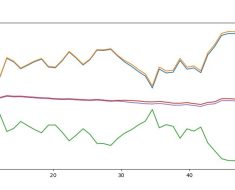
In a significant development, a recent study forecasts an enormous $1 trillion impact on the U.S. economy from generative AI over the coming decade. This prediction, however, comes with the caveat of potential job disruptions.
What Happened: As per a study released on Thursday by Cognizant Impact, generative AI is expected to significantly boost the U.S. economy, with an estimated impact of $1 trillion within the next ten years. However, this technological upheaval could disrupt up to 90% of jobs, reported MarketWatch.
“The research findings showcase just how quickly this technology might disrupt the trajectory of the U.S. economy, offering invaluable insights for leaders to harness its potential and adapt swiftly,” Adrian Cooper, chief executive at Oxford Economics, said in a statement. Cognizant partnered with Oxford Economics to create an economic model for the study
The study, which analyzed 18,000 tasks that power the U.S. economy, projects an increase in U.S. productivity ranging from 1.7% to 3.5%. This could add between $477 billion and $1 trillion annually to the U.S. GDP over the next decade, contingent upon business adoption rates.
However, the research also cautions that 52% of jobs face significant changes, with 9% of the present U.S. workforce potentially displaced, and an additional 1% may struggle to find new employment due to these economic alterations.
Why It Matters: This came after another study recently suggested that the world has entered an era dominated by artificial intelligence. Investment in AI is expected to peak at $200 billion globally by 2025, with $100 billion originating from the US.
Meanwhile, Peter Oppenheimer, a Goldman Sachs analyst, during his appearance on CNBC’s “Squawk Box Europe,” said the global economy is poised to transition into a fresh phase of growth, propelled by the explosion of artificial intelligence (AI) and efforts towards decarbonization.
Read Next: Bitcoin ETF Battle Heats Up: ‘US Government Plans To Seize All BTC ETFs,’ Warns Max Keiser
Image Via Shutterstock
Engineered by
Benzinga Neuro, Edited by
Kaustubh Bagalkote
The GPT-4-based Benzinga Neuro content generation system exploits the
extensive Benzinga Ecosystem, including native data, APIs, and more to
create comprehensive and timely stories for you.
Learn more.



